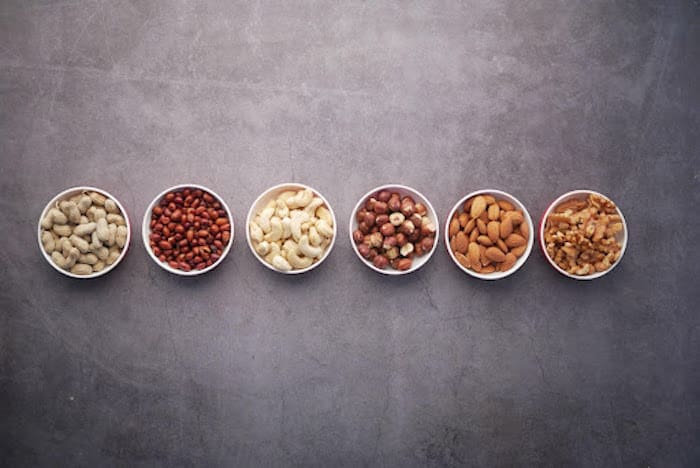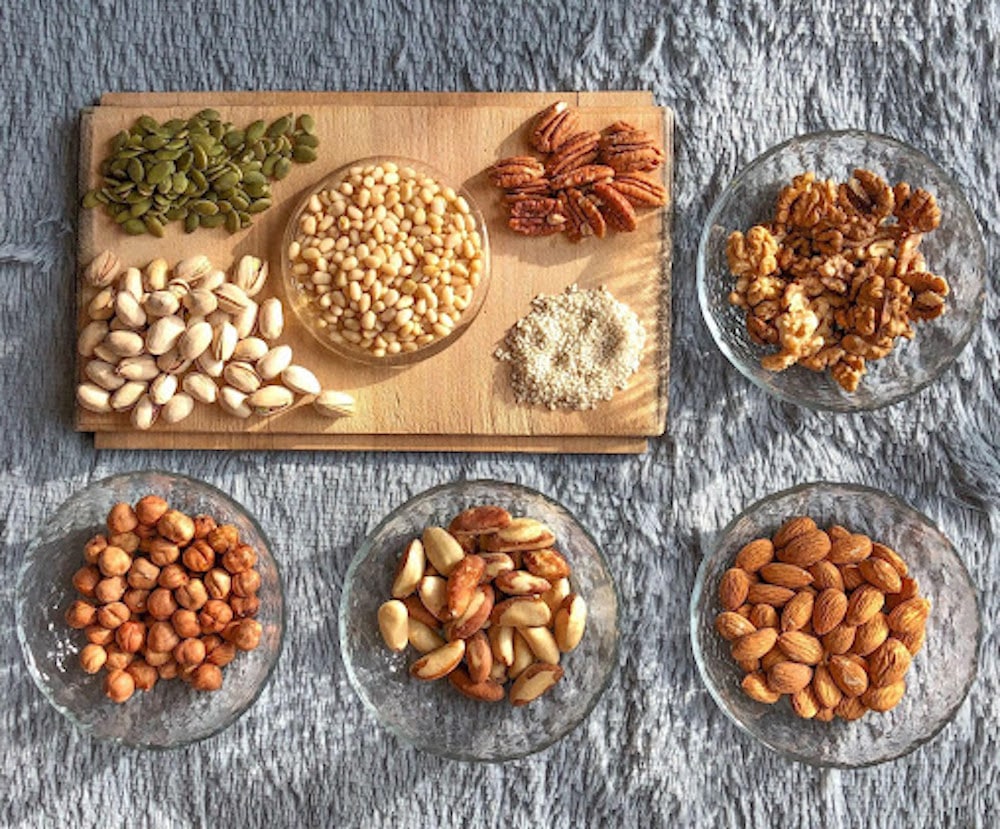Table of Contents
Dietary guidelines for the prevention of chronic diseases have changed recently to emphasize diets high in plant-based foods and low in animal-based foods. The majority of these plant-based eating regimens emphasize the consumption of nuts as a crucial element. Nuts are a good source of unsaturated fatty acids, dietary fiber, minerals, vitamins, and other bioactive components and have a distinctive nutritional makeup. This makes nuts an essential component of healthy eating.
Nuts’ high nutritional value has been proven to lower the risk of heart disease, cancer, Alzheimer’s, and diabetes, as well as extend lifespan. There are lots of reasons to enjoy nuts; in fact, research has shown that just two or three servings per week can significantly improve your overall health.
This guide provides details on the health benefits of eating different types of nuts so you can decide which ones are best for you and learn how to use them to maximize their health benefits. This will enlighten you, so next time you’re craving something crunchy and you reach for the Aldi ad, you can select some nuts instead of less healthy snacks like chips or candy bars.
Almonds Reduce Body Fat and Cholesterol
When you eat almonds, bad cholesterol (LDL), which is responsible for forming plaques in your coronary arteries that can result in heart attacks, is reduced. The LDL reduction is dose-dependent. This implies that eating more almonds can reduce your LDL cholesterol even more. Almonds have also been shown in clinical diet studies to lower your risk of developing insulin resistance and diabetes. Including almonds in your diet can, therefore, increase your sensitivity to insulin, even if you already have diabetes. Additionally, almonds can improve your chances of losing weight. In one study, including 84 grams, or about 3 ounces (oz), of almonds in a daily diet improved weight loss and produced a 14% reduction in body weight. Numerous studies have also demonstrated that eating almonds reduces body inflammation, which is great news because inflammation often causes pain and discomfort.
Brazilian Nuts Guard Against Cancer
According to dietitian Kelly R. Jones, RD, Brazilian nuts contain a lot of selenium, a mineral essential for antioxidant function in processes that guard against cancer and is involved in the production of thyroid hormones. One study even demonstrated an immediate effect on blood cholesterol nine hours after consumption. Additionally, Brazilian nuts are excellent for skin, hair, and nail health. But remember, these are big nuts. Don’t consume a whole handful of them like you would almonds; you only need two or three a day to reap the rewards.
Walnuts Maintain Clear Arteries
The majority of nuts have a lot of good fat. Walnuts contain 47% of these good fats, known as polyunsaturated fatty acids. Walnuts are the only nut that contains alpha-linoleic acid, a specific type of polyunsaturated fatty acid found in small amounts in most other nuts. It has been shown that alpha-linolenic acid’s anti-inflammatory properties reduce the formation of plaque in coronary arteries. It has been proven that eating walnuts improves cholesterol levels, the health of blood vessels, and the function of tiny arteries. According to recent studies, people who consumed 43 grams of walnuts everyday had lower levels of both total and LDL cholesterol.

Pistachios Lower Blood Pressure
Stress negatively affects our bodies and hearts, and it causes our blood pressure to rise. Get this: eating pistachios can lower your blood pressure when you’re under stress. When participants in a particular study consumed about 1.5 ounces of pistachios per day and were subjected to mental stress, their blood pressure rose less than that of the control group. In another study, a diet high in pistachios improved patients with diabetes’ response to stress, 24-hour blood glucose levels, and heart rate during a four-week trial. This means eating pistachios can lower total and LDL cholesterol in diabetics and lower their risk of developing artery-related heart disease.
Peanuts Can Lower The Risk Of Heart Disease
Numerous studies indicate that eating peanuts, including peanut butter, can lower the risk of heart disease. According to the Nurses’ Health Study, women who ate peanuts and peanut butter had a 34% lower risk of developing heart disease. The majority of the advantages were seen in people who consumed peanuts frequently. A serving of 1 ounce of peanuts and 1 tablespoon of peanut butter five times a week or more reduced the risk of heart disease by 44% in a study of 6,309 diabetic women. It has also been demonstrated that eating peanuts and peanut butter reduces diabetes risk in both thin and overweight women. Finally, peanuts, like many other nuts, can help you meet your protein needs while also lowering your cholesterol, especially when combined with other nutritious diet options.
Cashews Help Fight Fatigue
Cashews are said to have more iron than any other nut. Dieticians recommend more people include them in their diets since iron deficiency is the most prevalent nutrient deficiency. If you lack iron, fatigue happens. This is because your body can’t make enough hemoglobin in your red blood cells to deliver oxygen. Hemoglobin is a type of protein found in red blood cells. It transports oxygen from the lungs to every part of the body. Hemoglobin contains a considerable amount of iron. According to health experts, cashews are an excellent dairy substitute due to their creamy texture.
Photo by Pavel Kalenik on Unsplash


